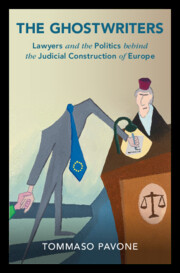Book contents
- Frontmatter
- Contents
- Figures
- Table
- Acknowledgments
- Part One Introduction
- Part Two Judges and Resistance to Change
- 2 Revisiting Judicial Empowerment in Europe: A Prelude
- 3 Renouncing Power and Resisting Change: Daily Work and Institutional Consciousness
- 4 The Limits of Rebellion: Judges and the Politics of Hierarchy
- Part Three Lawyers and the Uneven Push for Change
- Part Four Lawyers and the Rise of Contentious Politics
- Part Five Conclusion
- Appendix
- Bibliography
- Index
3 - Renouncing Power and Resisting Change: Daily Work and Institutional Consciousness
from Part Two - Judges and Resistance to Change
Published online by Cambridge University Press: 31 March 2022
- Frontmatter
- Contents
- Figures
- Table
- Acknowledgments
- Part One Introduction
- Part Two Judges and Resistance to Change
- 2 Revisiting Judicial Empowerment in Europe: A Prelude
- 3 Renouncing Power and Resisting Change: Daily Work and Institutional Consciousness
- 4 The Limits of Rebellion: Judges and the Politics of Hierarchy
- Part Three Lawyers and the Uneven Push for Change
- Part Four Lawyers and the Rise of Contentious Politics
- Part Five Conclusion
- Appendix
- Bibliography
- Index
Summary
Chapter 3 unpacks why national judges broadly eschewed turning to European law and the European Court of Justice (ECJ) when doing so could bolster their own power. It reveals historically rooted practices and knowledge deficits embodied in the trudge of daily work within civil service judiciaries that fostered what I call an “institutional consciousness” of path dependence: An accrued social identity tied to institutional place that magnifies the reputational risks and labor costs of mobilizing European law. This consciousness reifies judges’ sense of distance to Europe, legitimating a renouncement of agency and resistance to change. The core of this chapter revolves around interviews and oral histories with 134 judges across French, Italian, and German courts, contextualized via ethnographic fieldnotes, descriptive statistics, and secondary sources. The chapter will speak to readers interested in a historical and sociological understanding of what path dependence looks, sounds, and feels like in the courthouse, why judges in civil service judiciaries can be likened to street-level bureaucrats, and how immersive fieldwork can illuminate the habitual practices calcifying the behaviors and identities of judges.
Keywords
- Type
- Chapter
- Information
- The GhostwritersLawyers and the Politics behind the Judicial Construction of Europe, pp. 52 - 87Publisher: Cambridge University PressPrint publication year: 2022

